MercoPress. South Atlantic News Agency
Tag: Bank of England
-
Sunday, June 2nd 2024 - 10:04 UTC
Banknote featuring King Charles III will be issued 5 June, Bank of England

Banknotes featuring a portrait of King Charles III will be issued from 5 June 2024. The portrait of the King will appear on existing designs of all four banknotes (£5, £10, £20, and £50), with no other changes to the existing designs. This means you can check these notes in the same way you can check the polymer banknotes featuring Queen Elizabeth, announced the Bank of England.
-
Friday, May 10th 2024 - 10:46 UTC
Bank of England keeps rate at 5,25%; March inflation 3,2%, but services remain high, 6%
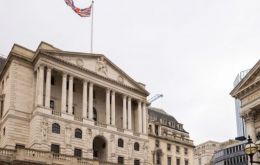
The Bank of England’s Monetary Policy Committee (MPC) at its meeting ending on 8 May 2024, voted by a majority of 7–2 to maintain Bank Rate at 5.25%. Two members preferred to reduce Bank Rate by 0.25 percentage points, to 5%.
-
Saturday, March 23rd 2024 - 14:24 UTC
Bank of England confirms restrictive monetary policy: keeps rates unchanged
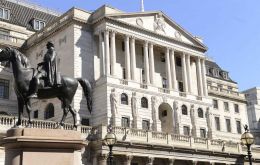
As decided by the US Federal Reserve, the Bank of England Monetary Policy Committee, (MPC) at its meeting ending on 20 March 2024, voted by a majority of 8–1 to maintain Bank Rate at 5.25%. One member preferred to reduce Bank Rate by 0.25 percentage points, to 5%.
-
Friday, February 2nd 2024 - 03:00 UTC
Bank of England leaves basic rate at 5,25%; little space for any cuts

The Bank of England Monetary Policy Committee, MPC, at its meeting ending on 31 January 2024, voted by a majority of 6–3 to maintain Bank Rate at 5.25%. Two members preferred to increase Bank Rate by 0.25 percentage points, to 5.5%. One member preferred to reduce Bank Rate by 0.25 percentage points, to 5%.
-
Sunday, November 5th 2023 - 10:23 UTC
UK economy on flat growth track, with decreasing inflation, BoE report
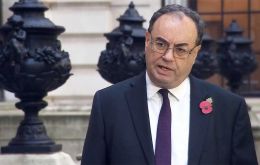
The UK economy is on flat growth for a couple of years, while government forecasts of greater activity vanish, and the Bank of England could still rise interest rates further. In effect the BoE has warned rates will remain high for some time or even rise higher. Rate currently stands at 5,25%, the highest in fifteen years.
-
Thursday, September 21st 2023 - 20:23 UTC
In a tight vote, Bank of England leaves interest rates unchanged, still the highest for 15 years

The United Kingdom interest rates were left unchanged after the Bank of England said price rises were slowing faster than expected. Interest rates were held at 5.25%, already their highest for 15 years, and comes after figures on Wednesday revealed an unexpected slowdown in inflation in August.
-
Wednesday, September 20th 2023 - 13:18 UTC
UK will have the highest inflation this year among G7 members, OECD report

Growth in the global economy is expected to remain “sub-par” next year, according to the Organization for Economic Cooperation and Development (OECD) which cut its forecast for 2024 from 2.9% to 2.7% on Tuesday.
-
Thursday, September 7th 2023 - 10:08 UTC
Bank of England says interest rates are close to their peak, but could inch further
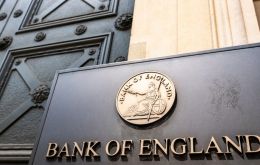
Bank of England Governor Andrew Bailey has said interest rates are close to their peak, but that they may still have further to rise. He told MPs on Wednesday “we are much nearer now to the top of the cycle” of rate rises.
-
Friday, August 4th 2023 - 08:17 UTC
Bank of England rate up to 5,25%, highest in fifteen years; no prospects of abating
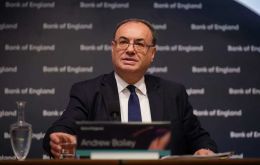
The Bank of England raised on Thursday its main interest rate to 5.25%, the highest in 15 years, as the country strives to control persistently high inflation. The quarter percentage point hike was the bank's 14th in a row.
-
Friday, June 23rd 2023 - 07:05 UTC
Bank of England raises the base rate to 5% given a stubborn inflation of 8,7%

The Bank of England, contrary to market expectations of a 25 basis points hike, on Thursday surprised with a 50 basis point hike to interest rates, its 13th consecutive increase as policymakers grapple with persistently high inflation.
